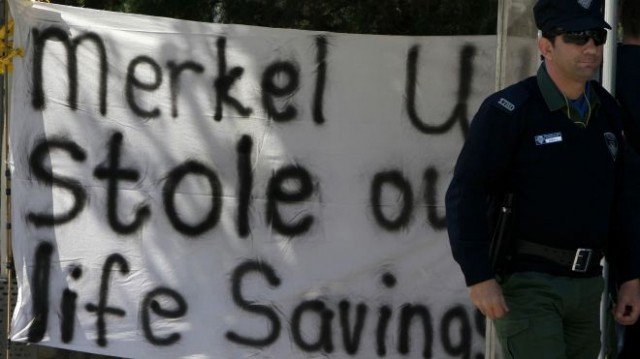Cyprus banks to remain closed until March 26
Cyprus officials have announced the country’s banks, which were closed to prevent mass withdrawals, will remain shut until at least Tuesday, March 26th.
The Cypriot government began an emergency meeting this afternoon to discuss alternatives to the EU-IMF bailout deal rejected by parliament on Tuesday.
Reports say the cabinet is considering imposing capital controls when banks are reopened.
Meanwhile, Cyprus’ finance minister is in Moscow to seek help from Russia.
Russia holds multi-billion dollar investments in Cyprus.
Finance Minister Michalis Sarris said after talks with Russian Finance Minister Anton Siluanov: “There were no offers, nothing concrete.”
Talks are expected to continue in Moscow on Thursday.
The banks will remain shut on Thursday and Friday this week and Monday March 25 is a scheduled bank holiday. The stock exchange also remains closed.
Germany has said banks in Cyprus may never reopen if a bailout is not agreed.
Earlier, Cypriot President Nicos Anastasiades met party leaders and the central bank governor in Nicosia to hammer out a Plan B, after a one-off tax on savings failed to get the support of any MPs.
Nicos Anastasiades has also been talking to the European Union, European Central Bank and IMF.
Bank mergers, a bond issue and more Russian funding have all been mentioned as ways to help the country out of the crisis.
The establishment of a “bad bank” which would take on risky assets held by Cypriot banks has also been mentioned by officials.
Cyprus’ banks are still giving out cash through machines – although with limits, and some are running low.
Some businesses are now refusing credit card payments.

Cyprus banks, which were closed to prevent mass withdrawals, will remain shut until at least March 26th
On Wednesday, German Chancellor Angela Merkel said she regretted but respected the Cypriot vote.
Angela Merkel said the eurozone had a duty to find a solution for Cyprus, but added that the country’s current banking system was “not sustainable”.
Cyprus’ banks were left exposed following the debt crisis in Greece and there are fears Cyprus could go bankrupt if they fail.
German Finance Minister Wolfgang Schaeuble warned Cyprus that its banks might never be able to reopen if it rejected the bailout.
The controversial levy had been proposed as the condition for the 10 billion-euro ($13 billion) EU and IMF bailout. Cyprus was expected to raise 5.8 billion euros through the one-off tax on bank savings.
The plan was altered on Tuesday to exempt savers with less than 20,000 euros, but a 6.75% charge on deposits of 20,000-100,000 euros and a 9.9% charge for those above 100,000 euros remained.
However, parliament rejected the deal, with 36 MPs voting against it, 19 abstaining and none in favour.
Protesters outside parliament reacted with joy at the decision.
Cyprus has attracted money through its lower taxes, with Russians holding between a third and half of all Cypriot deposits.
Russian private and corporate deposits are believed to total about $30 billion.
Russian President Vladimir Putin had called the bailout deal “unfair, unprofessional and dangerous”.
Analysts say Russia may provide more funding in return for interests in Cyprus’ offshore energy fields.
One offer of help has come from Cyprus’ Orthodox Church, which is a major shareholder in the third-largest domestic lender, the Hellenic Bank.
Archbishop Chrysostomos I said on Wednesday the Church was willing to mortgage its assets to invest in government bonds.
[youtube 8l8y1sWP0xc]
